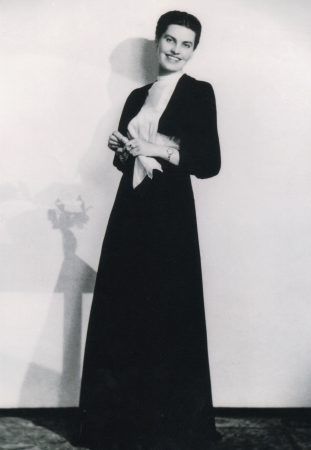Aleksandra Mianowska i ks. Ferdynand Machay z Krakowa
 Place
PlaceKraków
 People
PeopleMianowska Aleksandra
Machay Ferdynand, ks.
Seifert Felicja
Aleksandra Mianowska, a resident of Cracow, was a woman well educated. Before the war she became an assistant of the famous lawyer, proffesor Jerzy Langrod, and a wife of wonderful, incredibly handsome man Walery Bigay-Mianowski. The outbreak of the war in 1939, changed her life once and for all.
Walery joined the army as a volunteer. Aleksandra became a nurse and started cooperating with the conspiracy. When General Grot-Rowecki has created a Service for Soldiers, Aleksandra became a commander of the main chain. In 1940 Gestapo arrested her and set in the prison on Montelupich street, from which miraculously she was get out.
The abbot of St. Mary’s Church in Cracow at that time, was priest Ferdynand Machay. One day came to him a 11 years old daughter of a Jewish lawyer from Bielsk, her name was Felicja Seifert. Priest Machay put the girl’s name in the book of people who were baptized and prepared for her documents with new name – Elżbieta Smoleń. Aleksandra Mianowska took care of the girl. She hid little Elżbieta in her own apartment. After some time she found for her a safe house at the institution for orphans operated by nuns, where she was introduced as a „child from Volyn”. Aleksandra often visited her. The two of them raised an unusual bond, as after the war Mianowska talked about the little girl as „my daughter from occupation time”.
In 1945 relatives from Czechoslovakia came for Elżbieta to take her away. After departure contact between women has stopped. Many years later, in the newspaper “Przekrój” was publicized an article describing women story. Someone who knew Elżbieta found it and informed her about it. After many years of separation they have again found each other and met in Cracow. It was a great experience for both of them.
Life of Aleksandra Mirowska, women sensitive and full of empathy; is full of stories about helping Jewish population. Before the war she gave private lessons to Hubert Garda.
During the occupation, when Hubert’s and his father life was under threat, Aleksandra organized for them fake documents and a job in Building Service. Hubert didn’t survive the war. He was killed by the German officer. However he did not died because they found out that he was a Jew – he died because he tried to save life of beaten by Nazis farmer,
Mianowska also took care of the other girl, who managed to escape from ghetto in Cracow. The child was seriously ill, her legs were severely frostbitten. When her health got better, Aleksandra took her to her mother and sister, who were living in Warsaw. There custody of her took over Zofia Kossak-Sucka, one of the founders of the Council for Helping Jews „Żegota”.
Life after war was not easier. Aleksandra during all the years of occupation believed that her husband was alive, and they will be able to meet again. As it turned out, she became a widow in 1939. Moreover, for her husband operations in National Army she was repressed by new government.
On 12th November 1980 Aleksandra Mianowska for her heroic actions in the campaign to rescue people of Jewish origin was honored by the Institute Yad Vashem for Justice among the People of the World.
Bibliography:
- A. Budzińska, Ubi est dominus Bodak, „Zwierciadło” 1970, nr 5.
- A. Malatyńska-Stankiewicz, Dzielna dziewczyna, „Dziennik Polski” 1994, nr 157.
- H. Noskowicz-Bieroniowa, Renesansowa krakowianka, „Gazeta Krakowska” 1993, nr 12.
- FLV, List od Czesławy Pszczolińskiej-Burczak, Bielsko-Biała, 27.09.2013 r.: Życie wierne zasadom, [Red. nie dysponuje tytułem gazety, rokiem wydania, numerem].
- FLV, Nagranie audio, sygn. Mianowska Aleksandra, ks. Machay. WMA z 5 września
2013 r. - [Strona internetowa Archiwum ofiar terroru nazistowskiego i komunistycznego w Krakowie 1939-1956:] http://krakowianie1939-56.mhk.pl/pl/archiwum,1,mianowska,2278.chtm, dostęp: 10.04.2017 r.
DOCUMENTS:
No extra materials
